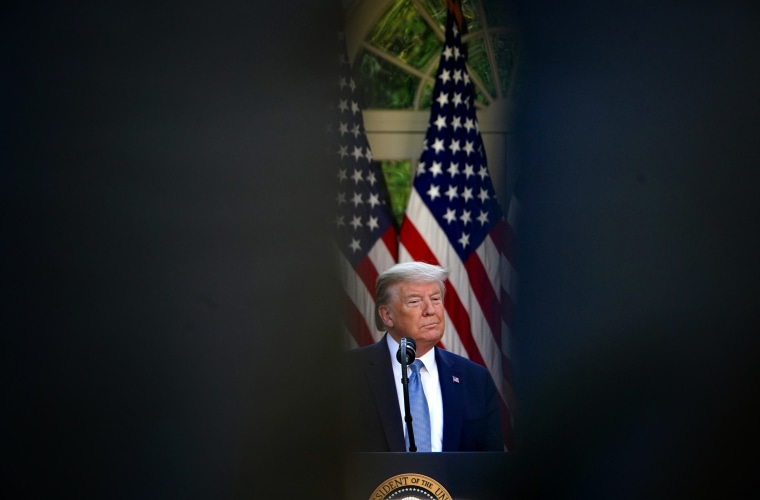Less than 24 hours after having consulted with some of the leading corporate executives in America, President Donald Trump surprised many of them with his action plan to reopen the economy, which he suggested Thursday could begin in some states as soon as "tomorrow."
The new federal guidelines, under which governors will determine when their states will open up for business, came just a day after the rushed coordination of more than 200 executives and thought leaders across a number of industries to counsel the president on how to open the economy.
Many of those CEOs told NBC News that they were not aware Thursday that Trump would issue guidelines later in the day.
Several executives have stressed the need for expanded testing to return to work safely, according to interviews with three people who participated in the White House's "opening our country council" teleconference Wednesday.
The U.S. has conducted more than 3 million tests for COVID-19, the disease caused by the coronavirus, since the outbreak began more than a month ago. That number falls short of experts' recommendations of millions of tests a week before people can return to work safely.
"We can all have economic forecasts, and we can all talk about the economic consequence of this, but unless people feel safe and secure and confident around the virus, the economic impact will continue in some way, shape or form," Goldman Sachs CEO David Solomon told investors Wednesday. "That is a very, very hard thing to predict. So I've tried to encourage companies that we've talked to, and individuals for that matter, to hope for the better but plan for the worse."
Full coverage of the coronavirus outbreak
Solomon was named as part of Trump's council, but he was unable to attend the call because it was scheduled at the same time as the company's quarterly earnings call.
In a quarterly earnings call with investors this week, JPMorgan Chase CEO Jamie Dimon said he believes "a rational plan to get back to work is a good thing to do, and hopefully it will be sooner rather than later."
"We're talking about June, July, August, something like that," he said.
BlackRock CEO Larry Fink told CNBC on Thursday, "I know many leaders told the president yesterday we need to have adequate [testing] to make sure we have a secured environment." He said he believes a "more normalized environment" would likely not be restored "in June or July."
"It may be in August," he said.
Amazon, whose CEO, Jeff Bezos, participated in Wednesday's call, told shareholders Thursday that it has "begun the work of building incremental testing capacity."
The structure of the president's call allowed time only for executives from some of the country's largest and best-known companies to speak, raising concerns that Trump may not have the unique challenges of every business at the top of his mind, according to executives who took part in the call.
"You talk to the head of Walmart and Amazon and they're doing better than ever. If you're a doctor, you try to take care of the sick people first rather than the healthy ones," Wolfgang Puck, the celebrity chef who runs about 100 restaurants across the country, told NBC News. "I just wish our last call with the president would have talked to us more [so] than the people who are so successful now."
The restaurant industry has taken a battering over the last six weeks. Estimates are that 5 million to 7 million jobs may be lost over the next three months, according to the National Restaurant Association. Puck said, for instance, that one of his Los Angeles restaurants has been reduced from 160 employees to run a 10,000-square-foot facility to just 12 to manage takeout orders.
Already, companies in states whose governors have rolled out their own reopening strategies are planning to open up for business again. States across the Northeast, along the Pacific Coast and in the Midwest announced pacts this week to reopen their economies. Boeing announced Thursday that it would begin operations again in western Washington facilities next week.
The company plans to stagger shift start times to reduce the flow of employees arriving at and leaving work, control social distancing with floor markings, continue virtual meetings and encourage employees who can telework to keep doing so. All 27,000 employees are strongly encouraged to bring their own procedural masks or other face coverings.
"This phased approach ensures we have a reliable supply base, our personal protective equipment is readily available and we have all of the necessary safety measures in place to resume essential work for our customers," Stan Deal, president and CEO of Boeing Commercial Airplanes, said in a statement Thursday.
Download the NBC News app for full coverage and alerts about the coronavirus outbreak
Cinemark, the country's third-largest movie chain, said Wednesday that it plans to reopen movie theaters starting in July. Theaters would either operate at 50 percent occupancy or sell every other seat to comply with any social distancing regulations that were still in place, CEO Mark Zoradi said on a call with investors. The return to business would also be staggered across multiple months and involve reduced operating hours, a spokeswoman told NBC News.
Volkswagen also announced that it would reopen its assembly plant in Chattanooga, Tennessee, the week of April 27, part of a "phased restart of production" of its global manufacturing system.
